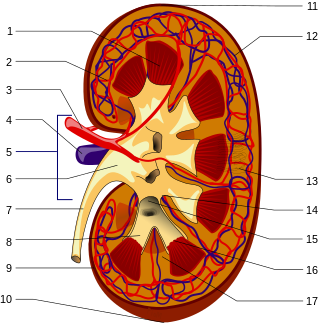Related Research Articles

Medicine is the science and practice of caring for patients, managing the diagnosis, prognosis, prevention, treatment, palliation of their injury or disease, and promoting their health. Medicine encompasses a variety of health care practices evolved to maintain and restore health by the prevention and treatment of illness. Contemporary medicine applies biomedical sciences, biomedical research, genetics, and medical technology to diagnose, treat, and prevent injury and disease, typically through pharmaceuticals or surgery, but also through therapies as diverse as psychotherapy, external splints and traction, medical devices, biologics, and ionizing radiation, amongst others.

Nephrology is a specialty for both adult internal medicine and pediatric medicine that concerns the study of the kidneys, specifically normal kidney function and kidney disease, the preservation of kidney health, and the treatment of kidney disease, from diet and medication to renal replacement therapy. The word "renal" is an adjective meaning "relating to the kidneys", and its roots are French or late Latin. Whereas according to some opinions, "renal" and "nephro" should be replaced with "kidney" in scientific writings such as "kidney medicine" or "kidney replacement therapy", other experts have advocated preserving the use of renal and nephro as appropriate including in "nephrology" and "renal replacement therapy", respectively.
In the medical profession, a general practitioner (GP) or family physician is a doctor who is a consultant in general practice. GPs have distinct expertise and experience in providing whole person medical care whilst managing the complexity, uncertainty and risk associated with the continuous care they provide. GPs work at the heart of their communities, striving to provide comprehensive and equitable care for everyone, taking into account their health care needs, stage of life and background. GPs work in, connect with and lead multidisciplinary teams that care for people and their families, respecting the context in which they live, aiming to ensure all of their physical and mental health needs are met. They are trained to treat patients to levels of complexity that vary between countries. The term "primary care physician" is more usually used in the US.
Internal medicine, also known as general internal medicine in Commonwealth nations, is a medical specialty for medical doctors focused on the prevention, diagnosis, and treatment of internal diseases in adults. Medical practitioners of internal medicine are referred to as internists, or physicians in Commonwealth nations. Internists possess specialized skills in managing patients with undifferentiated or multi-system disease processes. They provide care to both hospitalized (inpatient) and ambulatory (outpatient) patients and often contribute significantly to teaching and research. Internists are qualified physicians who have undergone postgraduate training in internal medicine, and should not be confused with "interns", a term commonly used for a medical doctor who has obtained a medical degree but does not yet have a license to practice medicine unsupervised.
A medical school is a tertiary educational institution, professional school, or forms a part of such an institution, that teaches medicine, and awards a professional degree for physicians. Such medical degrees include the Bachelor of Medicine, Bachelor of Surgery, Master of Medicine, Doctor of Medicine (MD), or Doctor of Osteopathic Medicine (DO). Many medical schools offer additional degrees, such as a Doctor of Philosophy (PhD), master's degree (MSc) or other post-secondary education.
Membership of the Royal Colleges of Physicians of the United Kingdom (MRCP(UK)) is a postgraduate medical diploma in the United Kingdom (UK). The examinations are run by the Federation of the Medical Royal Colleges – the Royal College of Physicians of London, the Royal College of Physicians of Edinburgh, and the Royal College of Physicians and Surgeons of Glasgow. The three Royal Colleges of Physicians share this common three part assessment in general medicine which consists of two written parts and one clinical examination. Examinations are held throughout the UK and in overseas centres.

Residency or postgraduate training is a stage of graduate medical education. It refers to a qualified physician, veterinarian, dentist, podiatrist (DPM) or pharmacist (PharmD) who practices medicine, veterinary medicine, dentistry, podiatry, or clinical pharmacy, respectively, usually in a hospital or clinic, under the direct or indirect supervision of a senior medical clinician registered in that specialty such as an attending physician or consultant. In many jurisdictions, successful completion of such training is a requirement in order to obtain an unrestricted license to practice medicine, and in particular a license to practice a chosen specialty. In the meantime, they practice "on" the license of their supervising physician. An individual engaged in such training may be referred to as a resident, registrar or trainee depending on the jurisdiction. Residency training may be followed by fellowship or sub-specialty training. Whereas medical school teaches physicians a broad range of medical knowledge, basic clinical skills, and supervised experience practicing medicine in a variety of fields, medical residency gives in-depth training within a specific branch of medicine.
A number of professional degrees in dentistry are offered by dental schools in various countries around the world.
A senior house officer (SHO) is a non-consultant hospital doctor in the Republic of Ireland and many Commonwealth countries. SHOs usually have a minimum of 1 year post medical school training. SHOs are supervised in their work by consultants and registrars. In training posts these registrars and consultants oversee training and are usually their designated clinical supervisors.
Acute medicine, also known as acute internal medicine (AIM), is a specialty within internal medicine concerned with the immediate and early specialist management of adult patients with a wide range of medical conditions who present in hospital as emergencies. It developed in the United Kingdom in the early 2000s as a dedicated field of medicine, together with the establishment of acute medical units in numerous hospitals. Acute medicine is distinct from the broader field of emergency medicine, which is concerned with the management of all people attending the emergency department, not just those with internal medicine diagnoses.
Medical education in the United Kingdom includes educational activities involved in the education and training of medical doctors in the United Kingdom, from entry-level training through to continuing education of qualified specialists. A typical outline of the medical education pathway is presented here. However training schemes vary in different pathways may be available.
A medicalintern is a physician in training who has completed medical school and has a medical degree, but does not yet have a license to practice medicine unsupervised. Medical education generally ends with a period of practical training similar to internship, but the way the overall program of academic and practical medical training is structured differs depending upon the country, as does the terminology used.
An allergist is a physician specially trained to manage and treat allergies, asthma and the other allergic diseases. They may also be called immunologists.
Addiction medicine is a medical subspecialty that deals with the diagnosis, prevention, evaluation, treatment, and recovery of persons with addiction, of those with substance-related and addictive disorders, and of people who show unhealthy use of substances including alcohol, nicotine, prescription medicine and other illicit and licit drugs. The medical subspecialty often crosses over into other areas, since various aspects of addiction fall within the fields of public health, psychology, social work, mental health counseling, psychiatry, and internal medicine, among others. Incorporated within the specialty are the processes of detoxification, rehabilitation, harm reduction, abstinence-based treatment, individual and group therapies, oversight of halfway houses, treatment of withdrawal-related symptoms, acute intervention, and long term therapies designed to reduce likelihood of relapse. Some specialists, primarily those who also have expertise in family medicine or internal medicine, also provide treatment for disease states commonly associated with substance use, such as hepatitis and HIV infection.
A specialty registrar (StR), previously known as and still commonly referred to as a specialist registrar (SpR), is a doctor, public health practitioner or dentist who is working as part of a specialty training programme in the UK. This is known as a training grade as these doctors are supervised to an extent, as part of a structured training experience that leads to being able to undertake independent practice in a hospital specialty or working as a general practitioner.
Fellow of the Royal Australasian College of Physicians, abbreviated as the post-nominal initials FRACP, is a recognition of the completion of the prescribed postgraduate specialist training programme in internal adult or internal paediatric medicine of the Royal Australasian College of Physicians.
Pediatric emergency medicine (PEM) is a medical subspecialty of both pediatrics and emergency medicine. It involves the care of undifferentiated, unscheduled children with acute illnesses or injuries that require immediate medical attention. While not usually providing long-term or continuing care, pediatric emergency doctors undertake the necessary investigations and interventions to diagnose patients in the acute phase, to liaise with physicians from other specialities, and to resuscitate and stabilize children who are seriously ill or injured. Pediatric emergency physicians generally practice in hospital emergency departments.

Pre-hospital emergency medicine, also referred to as pre-hospital care, immediate care, or emergency medical services medicine, is a medical subspecialty which focuses on caring for seriously ill or injured patients before they reach hospital, and during emergency transfer to hospital or between hospitals. It may be practised by physicians from various backgrounds such as anaesthesiology, emergency medicine, intensive care medicine and acute medicine, after they have completed initial training in their base specialty.

Physicians and surgeons play an important role in the provision of health care in Canada. They are responsible for the promotion, maintenance, and restoration of health through the study, diagnosis, prognosis, and treatment of disease, injury, and other physical and mental impairments. As Canadian medical schools solely offer the Doctor of Medicine (M.D.) or Doctor of Medicine and Master of Surgery degrees, these represent the degrees held by the vast majority of physicians and surgeons in Canada, though some have a Doctor of Osteopathic Medicine (D.O.) from the United States or Bachelor of Medicine, Bachelor of Surgery from Europe.
The Ghana College of Physicians and Surgeons is a National Postgraduate Medical College established to train specialist doctors in medicine, surgery and other related disciplines by an Act of parliament in 2003.
References
- ↑ "CT1/CT2 in Core Medical Training and Acute Care Common Stem". JRCPTB. Retrieved 3 February 2014.
- ↑ "CT1 Recruitment". Royal College of Physicians. Retrieved 3 February 2014.
- ↑ "Internal Medicine Interview". Internal Medicine Interview Website. Retrieved 26 December 2018.
- ↑ "Applying for Internal Medicine Training". 2 September 2021.
- ↑ "JRCPTB 2012 CMT ARCP Decision Aid" (PDF). JRCPTB. Retrieved 3 February 2014.[ permanent dead link ]
- ↑ "Internal Medicine Training". Health Education England / NHS England. Retrieved 18 June 2024.